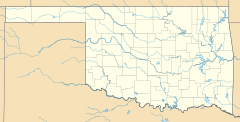Driftwood, Oklahoma facts for kids
Quick facts for kids
Driftwood, Oklahoma
|
|
|---|---|
| Country | United States |
| State | Oklahoma |
| County | Alfalfa |
| Incorporated | 1898 |
| Government | |
| • Type | unincorporated (part of Stella township) |
| Elevation | 1,191 ft (363 m) |
| Population
(1990)
|
|
| • Total | 27 (most recent available) |
| Time zone | UTC-6 (Central (CST)) |
| • Summer (DST) | UTC-5 (CDT) |
| ZIP codes |
73728
|
| Area code(s) | 580 |
| GNIS feature ID | 1092189 |
Driftwood is a very small community in northern Alfalfa County, Oklahoma, in the United States. It is called an "unincorporated community" because it does not have its own city government. Long ago, Driftwood was a busy little town. It had two churches, a grocery store, a barber shop, a gas station, a grain elevator, a two-story school, a telephone office, a bank, and a post office.
Today, Driftwood has fewer than a dozen homes. It also has a church and a cemetery. The community is located along both sides of Oklahoma State Highway 8 and State Highway 58.
Contents
History of Driftwood
Early Days and the U Ranch
Before Oklahoma became a state in 1907, the land where Driftwood is now was part of the Cherokee Outlet. This land was controlled by the Cherokee Nation. A well-known rancher named Major Andrew Drumm leased land from the Cherokee people in the 1870s and 1880s. He used this land for grazing his cattle.
His U Ranch covered about 150,000 acres. The ranch headquarters were located a few miles north of what is now Cherokee. This was just southeast of where Driftwood would later be.
Becoming a Town
The town of Driftwood was officially started in 1898. The name "Driftwood" came from a nearby stream called Driftwood Creek. This creek flows into the Medicine Lodge River.
Driftwood's post office opened on May 12, 1894. From 1902 to 1906, this post office also served a nearby town called Burlington. Burlington was known as Drumm back then.
Growth and Transportation
In 1901, a stage line began operating. This line connected nearby Kiowa, Kansas to towns in Alfalfa County. These towns included Burlington, Driftwood, Cherokee, Yewed, and Augusta.
The county's first railroad also came through Driftwood. It was called the Choctaw Northern Railroad. This railroad connected Driftwood to other towns like Aline, Augusta, Lambert, Ingersoll, and Amorita. It also went into Kansas.
The population of Driftwood reached its highest point in 1930, with 71 people living there.
Decline and Changes
The railroad line that went through Driftwood was closed in 1936. The town's post office also closed on October 31, 1959. By 1963, the population had dropped to 32 people.
In the 1960s, the local schools from Driftwood, Byron, Amorita, and Burlington all joined together. They became part of the Burlington School District in nearby Burlington. After the railroad closed and the population kept shrinking, it became hard for Driftwood to keep its schools and city services. By 1980, Driftwood was no longer an incorporated town. By the 1990 census, its population had gone down to just 27 people.
Geography
Driftwood is located in the north-central part of Alfalfa County. It sits along Oklahoma State Highway 8 and State Highway 58. It is about 8 miles (13 km) south of the Kansas-Oklahoma border.
Driftwood is also about 8 miles (13 km) straight north of Cherokee. It lies roughly 1 mile (1.6 km) west of the Medicine Lodge River. The U.S. Geological Survey lists Driftwood's elevation as 1,191 feet (363 meters) above sea level.
Notable People
R. Orin Cornett
R. Orin Cornett (1913 – 2002) was born in Driftwood on November 14, 1913. He was a very smart person who earned his doctorate degree in physics and applied mathematics in 1940. He taught physics, mathematics, and electronics at several universities, including Oklahoma Baptist, Penn State, and Harvard.
Cornett is famous for inventing Cued Speech. This is a system that helps deaf people understand spoken language by using hand shapes near the mouth. He also worked as a vice president at Oklahoma Baptist University and held important roles at Gallaudet University, a university for deaf and hard-of-hearing students.
 | Selma Burke |
 | Pauline Powell Burns |
 | Frederick J. Brown |
 | Robert Blackburn |



